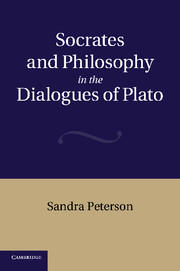Book contents
- Frontmatter
- Contents
- Acknowledgments
- Abbreviations
- Preface
- Chapter 1 Opposed hypotheses about Plato's dialogues
- Chapter 2 Socrates in the Apology
- Chapter 3 Socrates in the digression of the Theaetetus:
- Chapter 4 Socrates in the Republic, part i: speech and counter-speech
- Chapter 5 Socrates in the Republic, part ii: philosophers, forms, Glaucon, and Adeimantus
- Chapter 6 Socrates in the Phaedo: another persuasion assignment
- Chapter 7 Others' conceptions of philosophy in the Euthydemus, Lovers, and Sophist
- Chapter 8 Socrates and Plato in Plato's dialogues
- Chapter 9 Socrates and philosophy
- Bibliography
- Index of passages cited
- General index
Chapter 4 - Socrates in the Republic, part i: speech and counter-speech
Published online by Cambridge University Press: 03 May 2011
- Frontmatter
- Contents
- Acknowledgments
- Abbreviations
- Preface
- Chapter 1 Opposed hypotheses about Plato's dialogues
- Chapter 2 Socrates in the Apology
- Chapter 3 Socrates in the digression of the Theaetetus:
- Chapter 4 Socrates in the Republic, part i: speech and counter-speech
- Chapter 5 Socrates in the Republic, part ii: philosophers, forms, Glaucon, and Adeimantus
- Chapter 6 Socrates in the Phaedo: another persuasion assignment
- Chapter 7 Others' conceptions of philosophy in the Euthydemus, Lovers, and Sophist
- Chapter 8 Socrates and Plato in Plato's dialogues
- Chapter 9 Socrates and philosophy
- Bibliography
- Index of passages cited
- General index
Summary
The Republic is an interesting case for my hypothesis that the Socrates of all of Plato's dialogues is the same questioning character as the Socrates of the Apology. It has seemed to many readers, on the contrary, that there are two different Socrateses even within the Republic. That is one of two interpretative problems about the Republic with which I begin.
STRANGENESS AND DISCONTINUITY
There is wide agreement among readers of the Republic that in the last nine of its ten books Socrates proposes many views that are in various ways strange. One or another very careful and very sympathetic commentator has called one or another of these views “curious,” “altogether peculiar,” “philosophically frustrating,” “seriously flawed,” “very ugly,” “risible absurdity,” “too hasty and too crude,” “embarrassingly bad,” “botched,” “outlandish,” “a mistake,” “shocking,” “truly bizarre,” “preposterous,” “hysterical,” “utterly grotesque,” “repellent,” “inhuman,” “incoherent,” “nearly unintelligible,” or has said that they “rightly move us to horror.” The strangeness of Socrates' proposals in the Republic needs explanation: can the Socrates of the Republic possibly mean what he says?
A second feature of the Republic that needs explanation is the much-noticed feature that the Socrates of book 1 seems very different from the Socrates of books 2–10. In book 1 Socrates questions several interlocutors and reduces their answers to absurdity. He claims that he is ignorant about justice. He is the examining and ignorant Socrates of the Apology.
- Type
- Chapter
- Information
- Socrates and Philosophy in the Dialogues of Plato , pp. 90 - 119Publisher: Cambridge University PressPrint publication year: 2011

